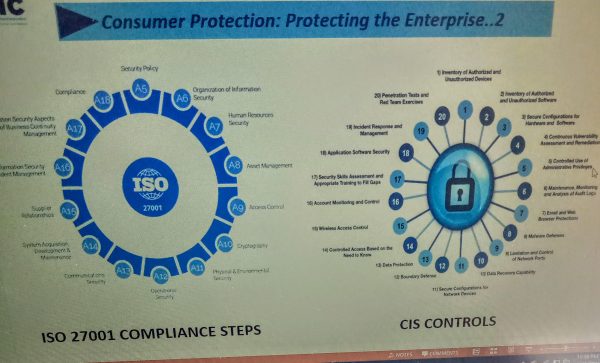CAPTION
MD/CE NDIC, Bello Hassan (2nd left) presenting NDIC research publications to the Executive Governor of Gombe State, Muhammad Inuwa Yahaya (3rd left) while Director, Communication & Public Affairs NDIC, Bashir A. Nuhu (1st left); Chief of Staff to Gombe State Governor, Abubakar Inuwa Kari (4th left); Executive Director, Operations, NDIC, Mustapha Mohammed Ibrahim (2nd right) and Deputy Director, MD/CE’s Office NDIC, Iliyasu Sani watch during courtesy call to the Governor before the opening ceremony of the just concluded 2021 NDIC FICAN Workshop in Gombe.
Cybercrime is impacting negatively on Individuals and Organisations in Nigeria. It poses a great threat to individuals and organizations, hence there should be increased efficiency and effectiveness in the investigation, prosecution and adjudication of cybercrime.
The Head, Information Technology Department, Nigeria Deposit Insurance Corporation, NDIC, Imade Uhunmwagbo, made this known at the just concluded 2021 NDIC Retreat for Business Editors and Finance Correspondents Association of Nigeria, FICAN, with the theme: Cybercrime & Cyber-risks landscape in Nigeria and the need for consumer protection held Gombe, Gombe State.
“Additionally, there should be efficient and effective short and long-term response to cybercrime by Government, including national coordination, data collection and effective legal frameworks, leading to a sustainable response and greater deterrence”, he said.
He maintained that there should be strengthened national and international communication/collaboration between government, law enforcement and the private sector with increased public awareness on the risks of cybercrime.
Uhunmwagbo listed the Regulatory Response to include: Networking, Collaboration and Information Sharing (FSRCC, Bankers Committee, NITDA, NCC and NIBSS, sstrengthening Laws, Regulations, Guidelines and Frameworks for Cybersecurity (NDPR Act, 2019, Cybercrime Act 2015, CBN Risk-based Cybersecurity Framework, Data Protection Bill, 2020, and enforcement of Best Practice during Bank Examination: Frequency of Access Right Reviews, Backups: Data Protection, Encryption, Business Continuity, Regular Trainings and Awareness on Cybersecurity.
Others are enforcement of Cybersecurity Frameworks: Adoption of ISO 27001, NDPR Compliance and creation of NGCERT (Nigeria Computer Emergency Response Team) under NSA.

Speaking on protecting the end user, he said, “the best protection against identity theft is to carefully guard your personal information, that is, do not share your bank details such as Access Code, Username and Password or any other login information, with anyone, do not store this information on your computer/browser. If you write your Customer Access Code/Password down, keep them in a safe place where they will not be easily found by others, if you receive an email and are not sure if it is legitimate, go directly to our website and login from there; do not click on the link provided in the email, do not be intimidated by an email that suggests dire consequences if you do not provide the information immediately”.
“Be suspicious if someone contacts you unexpectedly asking for your personal information. Your financial institution will NEVER call to get your personal details. NEVER respond to an e-mail that asks for your confidential or personal security information. Ensure to download your mobile banking app from Apple or Goggle App Stores ONLY. Choose PINs and passwords that are difficult to guess and avoid using easily identifiable information, such as your mother’s maiden name, birth dates and phone numbers, ensure you get alert for every transaction that occur on your account and as a precaution, Do Not leave large sums of money in your online”, he advised.
He listed factors leading to cybercrime in Nigeria to include high rate of unemployment, the quest for wealth, lack of strong cybercrime laws, and inadequate security on personal devices amongst others – have blended to make cybercrime a significant problem in Nigeria.
Others are absence of sufficient laws to prevent and punish cybercrimes, advances in technology and improvement in the business environment that leads to high internet penetration and technology adoption, accessibility to data and mobile devices, get rich quick mentality, bad Influencers that are accepted in the society, dearth of skilled personnel that can detect and track cybercriminals and low level collaboration among jurisdictions on cybercrime.
List of cybercrimes in Nigeria according to him include: Business E-mail Compromise, BEC, romance Scam, investment Scam, BVN Fraud, Identity Theft and Cyber Stalking.
The term cybersecurity according to him is used to refer to the security offered through online services to protect your online information. Cybersecurity involves protection of sensitive personal and business information through prevention, detection and response to different online attacks.
“Cybersecurity is necessary since it helps in securing data from threats or misuse as well as safeguard your system from harmful contents. Cybercrime is a fast-growing type of crime. More and more criminals are exploiting the speed, convenience and anonymity of the Internet to commit diverse range of criminal activities that know no borders; either physical or virtual, cause serious harm and pose very real threats to unsuspecting victims”, he added.
In Nigeria, some cybercrimes affecting businesses and individuals are listed to include phishing attacks, website spoofing, Ransomware and malware attacks.





















